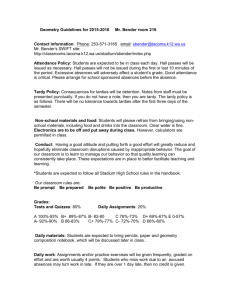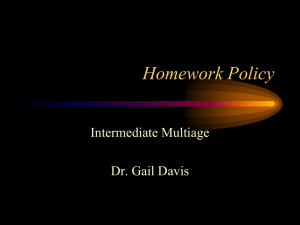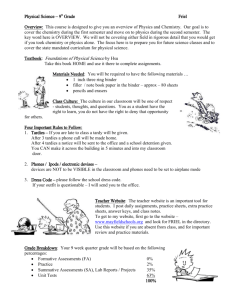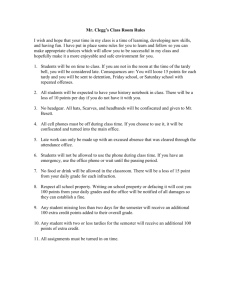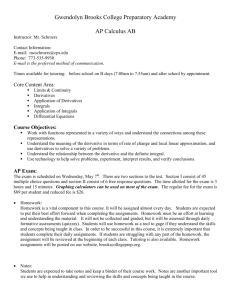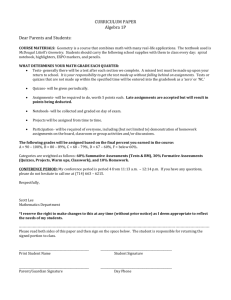File
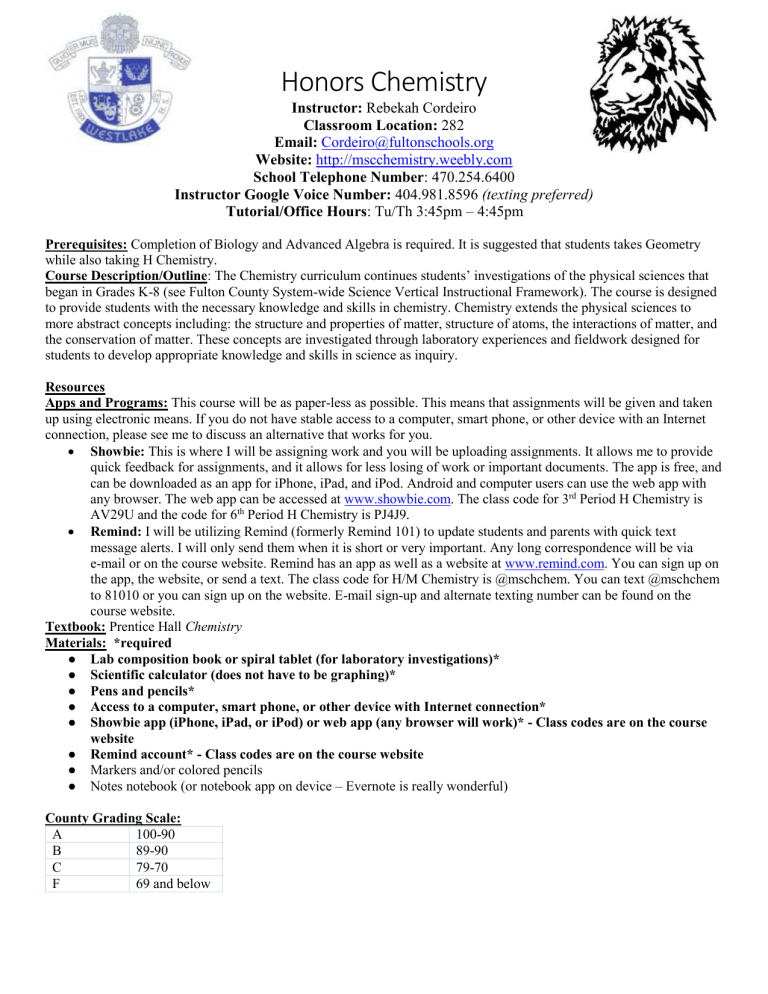
Honors Chemistry
Instructor:
Rebekah Cordeiro
Classroom Location:
282
Email: Cordeiro@fultonschools.org
Website: http://mscchemistry.weebly.com
School Telephone Number
: 470.254.6400
Instructor Google Voice Number:
404.981.8596
(texting preferred)
Tutorial/Office Hours
: Tu/Th 3:45pm – 4:45pm
Prerequisites: Completion of Biology and Advanced Algebra is required. It is suggested that students takes Geometry while also taking H Chemistry.
Course Description/Outline : The Chemistry curriculum continues students’ investigations of the physical sciences that began in Grades K-8 (see Fulton County System-wide Science Vertical Instructional Framework). The course is designed to provide students with the necessary knowledge and skills in chemistry. Chemistry extends the physical sciences to more abstract concepts including: the structure and properties of matter, structure of atoms, the interactions of matter, and the conservation of matter. These concepts are investigated through laboratory experiences and fieldwork designed for students to develop appropriate knowledge and skills in science as inquiry.
Resources
Apps and Programs: This course will be as paper-less as possible. This means that assignments will be given and taken up using electronic means. If you do not have stable access to a computer, smart phone, or other device with an Internet connection, please see me to discuss an alternative that works for you.
Showbie: This is where I will be assigning work and you will be uploading assignments. It allows me to provide quick feedback for assignments, and it allows for less losing of work or important documents. The app is free, and can be downloaded as an app for iPhone, iPad, and iPod. Android and computer users can use the web app with any browser. The web app can be accessed at www.showbie.com
. The class code for 3 rd Period H Chemistry is
AV29U and the code for 6 th Period H Chemistry is PJ4J9.
Remind: I will be utilizing Remind (formerly Remind 101) to update students and parents with quick text message alerts. I will only send them when it is short or very important. Any long correspondence will be via e-mail or on the course website. Remind has an app as well as a website at www.remind.com
. You can sign up on the app, the website, or send a text. The class code for H/M Chemistry is @mschchem. You can text @mschchem to 81010 or you can sign up on the website. E-mail sign-up and alternate texting number can be found on the course website.
Textbook: Prentice Hall Chemistry
Materials: *required
● Lab composition book or spiral tablet (for laboratory investigations)*
● Scientific calculator (does not have to be graphing)*
● Pens and pencils*
● Access to a computer, smart phone, or other device with Internet connection*
● Showbie app (iPhone, iPad, or iPod) or web app (any browser will work)* - Class codes are on the course website
●
Remind account* - Class codes are on the course website
● Markers and/or colored pencils
● Notes notebook (or notebook app on device – Evernote is really wonderful)
County Grading Scale:
A 100-90
B
C
F
89-90
79-70
69 and below
Course Weights:
Category of Assignments
Final Exam
Formative Assessment
Performance Assessment
Portfolio
Summative Assessment
Quiz
Percentage of Cumulative Semester Grade
20%
0% (These assignments WILL AFFECT the portfolio grade.)
25%
20%
25%
10%
Description of Assignments:
Final Exam - The goal of any final exam is to evaluate student learning at the end of an instructional period by comparing it against some standard or formative assessment. This course will have a midterm exam in the Fall Semester and a Final
Exam in the Spring Semester. The Spring exam may be the County SLO exam.
Formative Assessment - The goal of any formative assessment is to monitor student learning to provide ongoing feedback that can be used by instructors to improve their teaching and by students to improve their learning. More specifically, formative assessments:
help students identify their strengths and weaknesses and target areas that need work
help faculty recognize where students are struggling and address problems immediately
Examples of formative assessments that will be used in this course include:
classwork and homework activities
district level benchmarks
common course assessments
unannounced (pop) quiz
exit tickets
* Note: Students please be forewarned, not taking Formative Assessments seriously will most likely result in failed quizzes and summative assessments.*
Performance Assessment - The goal of any performance assessment is to measure student learning as to what students can do with what they know, rather than how much they know. With performance assessment, students are engaged in tasks in which they are crafting products. Student work is guided via rubrics, exemplar models, and teacher feedback all along the way. Performance assessments are an excellent way to differentiate instruction based on student interest and learning style. Performance assessments that will be used in this course are labs, projects, and presentations.
Portfolio - The design of any portfolio is to be a purposeful collection of student work that tells the story of student achievement or growth. Within this limited definition, a portfolio system should:
promote student self-assessment and control of learning
support student-led parent conferences
certify student competence
build student self-confidence
evaluate curriculum and instruction
Because there is no single correct way to “do” portfolios, there are really only two basic reasons for doing them:
(1) Assessment usage - keeping track of what students know and can do
(2) Instructional usage - promoting learning where students learn merely by assembling and reviewing the portfolio.
Examples of portfolio artifacts that this teacher will require for this course may include but are not limited to:
completion of mastery-based online computer assignments
student-corrected classwork/homework assignments (rubric will be given)
student-corrected formative assessments (rubric will be given)
student-corrected quizzes (rubric will be given)
Summative Assessment - The goal of any summative assessment is to evaluate student learning at the end of an instructional unit by comparing it against some standard or formative assessment. Examples of summative assessments for this course include unit tests.
Quiz - The goal of any quiz is to evaluate student learning after instruction of a single learning task by comparing it against some standard or formative assessment. Quizzes reflect the rigor of the course, so it is the responsibility of the individual teacher to differentiate them based on course descriptions and student learning objectives.
Unit Title, Standards & Elements Weeks Calendar Dates Time Frame
Unit 1 – Safety and Characteristics of Science 2 8/10/15 – 8/25/15
SCSh2. Students will use standard safety practices for all classroom laboratory and field investigations.
a. Follow correct procedures for use of scientific apparatus.
b. Demonstrate appropriate techniques in all laboratory situations.
c. Follow correct protocol for identifying and reporting safety problems and violations.
SCSh8. Students will understand important features of the process of scientific inquiry.
Students will apply the following to inquiry learning practices:
a. Scientific investigators control the conditions of their experiments in order to produce valuable data.
b. Scientific researchers are expected to critically assess the quality of data including possible sources of bias in their investigations’ hypotheses, observations, data analyses, and interpretations.
c. Scientists use practices such as peer review and publication to reinforce the integrity of scientific activity and reporting.
d. The merit of a new theory is judged by how well scientific data are explained by the new theory.
e. The ultimate goal of science is to develop an understanding of the natural universe which is free of biases.
f. Science disciplines and traditions differ from one another in what is studied, techniques used, and outcomes sought.
Unit 2 – Atomic Structure & Nature of Matter 6 8/26/15-9/24/15
SC1. Students will analyze the nature of matter and its classifications.
a. Relate the role of nuclear fusion in producing essentially all elements heavier than hydrogen.
b. Identify substances based on chemical and physical properties.
SC3. Students will use the modern atomic theory to explain the characteristics of atoms.
a. Discriminate between the relative size, charge, and position of protons, neutrons, and electrons in the atom.
c. Explain the relationship of the proton number to the element’s identity.
d. Explain the relationship of isotopes to the relative abundance of atoms of a particular element.
Unit 3 – Electron Configuration, the Periodic Table, & Periodicity 5 9/25/15 - 10/29/15
SC3. Students will use the modern atomic theory to explain the characteristics of atoms.
b. Use the orbital configuration of neutral atoms to explain its effect on the atom’s chemical properties.
f. Relate light emission and the movement of electrons to element identification.
SC4. Students will use the organization of the Periodic Table to predict properties of elements.
a. Use the Periodic Table to predict periodic trends including atomic radii, ionic radii, ionization energy, and electronegativity of various elements.
b. Compare and contrast trends in the chemical and physical properties of elements and their placement on the Periodic Table.
Unit 4 – Chemical Bonding and the Mole 5 11/2/15 – 12/15/15
SC1. Students will analyze the nature of matter and its classifications.
c. Predict formulas for stable ionic compounds (binary and tertiary) based on balance of charges.
d. Use IUPAC nomenclature for both chemical names and formulas:
*Ionic compounds (binary and tertiary)
*Covalent compounds (binary and tertiary)
*Acidic compounds (binary and tertiary)
SC2. Students will relate how the Law of Conservation of Matter is used to determine chemical composition in compounds and chemical reactions.
c. Apply concepts of the mole and Avogadro’s number to conceptualize and calculate:
*Empirical/molecular formulas,
*Mass, moles, and molecular relationships,
*Molar volumes of gases.
SC3. Students will use the modern atomic theory to explain the characteristics of atoms.
e. Compare and contrast types of chemical bonds (i.e. ionic, covalent).
Unit 5 – Chemical Reactions and Stoichiometry 8 1/6/15 – 2/11/15
SC2. Students will relate how the Law of Conservation of Matter is used to determine chemical composition in compounds and chemical reactions.
a. Identify and balance the following types of chemical equations:
*Synthesis
*Decomposition
*Single replacement
*Double replacement
*Combustion
b. Experimentally determine indicators of a chemical reaction specifically precipitation, gas evolution, water production, and changes in energy to the system.
d. Identify and solve different types of stoichiometry problems, specifically relating mass to moles and mass to mass.
e. Demonstrate the conceptual principle of limiting reactants (FCS pacing guide does not mandate this substandard).
Unit 6 – Kinetic Theory of Matter 3 2/12/15 – 3/2/15
SC6. Students will understand the effects motion of atoms and molecules in chemical and physical processes.
a. Compare and contrast atomic/molecular motion in solids, liquids, gases, and plasmas.
Teacher Note: The use of Gas Laws to achieve this standard is permissible, but not mandated.
Unit 7 – Solutions, Acids & Bases 4 3/3/15 – 3/29/15
SC7. Students will characterize the properties that describe solutions and the nature of acids and bases.
a. Explain the process of dissolving in terms of solute/solvent interactions:
• Observe factors that affect the rate at which a solute dissolves in a specific solvent,
• Express concentrations as molarities,
• Prepare and properly label solutions of specified molar concentration,
• Relate molality to colligative properties.
b. Compare, contrast, and evaluate the nature of acids and bases:
• Arrhenius, Bronsted-Lowry Acid/Bases
• Strong vs. weak acids/bases in terms of percent dissociation
• Hydronium ion concentration
• pH
• Acid-Base neutralization
Unit 8 – Reaction Dynamics & Thermodynamics 3 3/31/15 – 4/30/15
SC5. Students will understand that the rate at which a chemical reaction occurs can be affected by changing concentration, temperature, or pressure and the addition of a catalyst.
a. Demonstrate the effects of changing concentration, temperature, and pressure on chemical reactions.
b. Investigate the effects of a catalyst on chemical reactions and apply it to everyday examples.
c. Explain the role of activation energy and degree of randomness in chemical reactions. (FCS pacing guide does not mandate this substandard).
SC6. Students will understand the effects motion of atoms and molecules in chemical and physical processes.
b. Collect data and calculate the amount of heat given off or taken in by chemical or physical processes.
c. Analyzing (both conceptually and quantitatively) flow of energy during change of state (phase).
2nd Semester Final Exam
*This schedule is subject to change.
Dress Code/Lab Dress Code: Due to the lab experiences involving chemicals and glassware, students must dress properly to decrease chances of injury while preforming certain labs. Students will be required to wear closed-toe shoes, non-baggy clothes, no dangling jewelry, and with long hair tied up. If this dress code is not met, the student will not be allowed to participate in the lab experience and will receive an alternate (more boring) assignment.
Westlake High School Tardy Policy: Students should be in class on time each day. Students are considered tardy if they arrive to class after the tardy bell rings for each period. Students receive a one-minute warning bell when for each tardy bell.
Tardies are excused only when students have passes from administration. Teachers are not to send students to other classes late. Below are the consequences for tardies:
* 1-3 tardies: Warning-Teacher will contact parent
* 4 tardies: Tuesday Detention-Teacher/Administrator will contact parent
* 6 tardies: Tuesday and Thursday Detention- Teacher/Administrator will contact parent
* 8 tardies: Teacher/Administrator will contact parent. Saturday Detention will be assigned and a tardy contract implemented with parent
* 10+ tardies: Administration will review/revise the tardy contract and ISS will be assigned
Westlake High School Academic Honesty Policy: Student Academic Integrity: as exerted from the Fulton County Board
Policy The Board of Education regards academic honesty as a cornerstone of its educational mission. Cheating will not be tolerated in this school system. Each school shall have a rule prohibiting cheating which shall be made available to students and parents. At a minimum, the rules should contain the following: c. Range of possible academic consequences, which may include, when the principal or designee deems appropriate, repeating the assignment or a similar assignments, receiving a reduced grade or a zero on the test or assignment or other consequences at the discretion of the principal.
d. Range of possible extracurricular consequences, which may include exclusion from extracurricular activities, interscholastic activities, honor societies and clubs; ineligibility for school offices or school honors; and other consequences at the discretion of the principal.
This year, Westlake will be instituting an Academic Integrity Council. With that, Westlake will be implementing a policy where no grade of a zeros will be assigned to a student for cheating. The Academic Integrity Council will communicate its purpose, the policies for reporting and appealing violations, and procedures by which it will operate.
Fulton County Make-Up Work Policy:
If you have an excused absence on the day it is assigned, then you will have one day to turn the assignment in without penalty. If you miss a test, you must make up the test after school within 5 days of your return to school. (Make up work policy subject to change for Performance Assessments).
Late Work Policy:
If you are present when an assignment is given, then I expect you to turn in the work on the day that it is due. If you are present in class and fail to submit an assignment upon teacher request on the day that it is due, then you will receive a grade of
NHI (not handed in, which calculates as a zero) for that assignment. If you have an unexcused absence on the day the assignment is due, then you will receive a grade of a NHI for that assignment.
Recovery Policy:
Provision for Improving Grades
1.
Opportunities designed to allow students to recover from a low or failing cumulative grade will be allowed when all work required to date has been completed and the student has demonstrated a legitimate effort to meet all course requirements including attendance. Students should contact the teacher concerning recovery opportunities. Teachers are expected to establish a reasonable time period for recovery work to be completed during the semester. All recovery work must be directly related to course objectives and must be completed ten school days prior to the end of the semester.
2.
Teachers will determine when and how students with extenuating circumstances may improve their grades.
Classroom Expectations/Procedures: The teacher and the students will adhere to the Westlake Rules and Procedures Policy as outlined in the Student Handbook as well as the following classroom rules:
Expected Classroom behaviors:
1.
Please, keep all food and drink outside of class.
2.
Be in your seat when the tardy bell rings.
3.
Leaving class is for emergencies only.
4.
Respect others who are talking.
5.
Show respect to other people, their ideas and opinions.
6.
Only work on classroom (Chemistry) assignments in class.
7.
All laboratory safety rules must be followed in class.
8.
Be prepared. i.
Bring materials to class - textbook, pencil, calculator, paper, and notebook. ii.
Bring ALL due assignments to class. Students will not be allowed under any circumstances to go to their lockers or to their cars to retrieve assignments.
9.
All work involving mathematical computations must be shown to receive credit.
10.
According to Fulton County School Policy: “Students shall not alter or attempt to alter school or private property including technology hardware and software.” This includes:
❖
Changing desktop settings or control panels on computers.
❖
Removing or damaging mouse tracking balls keyboard keys, cables, connectors, network jacks, or any other hardware.
❖ Modifying computer software, damaging computer disks, CD ROM’s, or other media
❖
Take care of books, desks, and lab equipment.
Consequences:
The student that fails to follow safety or classroom rules will be subject to detention and/or referred to the administration for further disciplinary action.
Use of Electronic Devices:
Cell phones cannot be on or visible unless authorized by the teacher for instructional purposes.
Hall Passes:
Hall passes will be written for emergency restroom purposes only. They will not be written for counselor, student services, front office, coach, teacher, or any other type of visitation.
*This syllabus is a general outline of the course and is subject to modification at any time without prior notification at the
discretion of the instructor.
